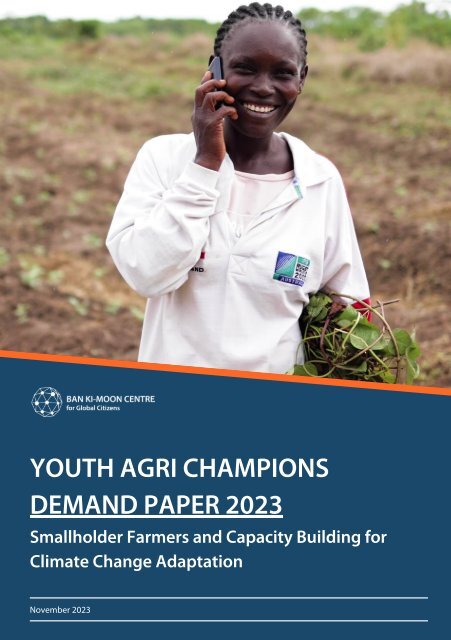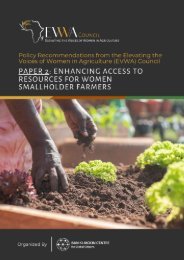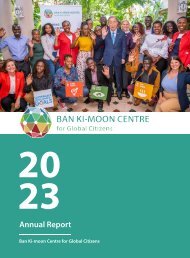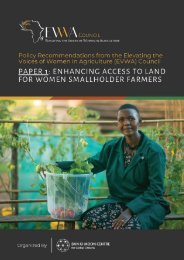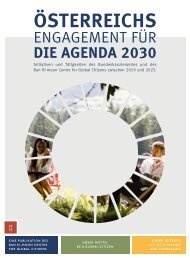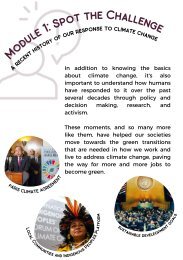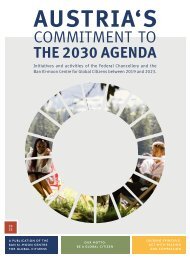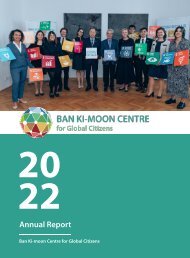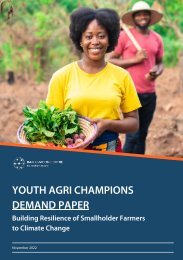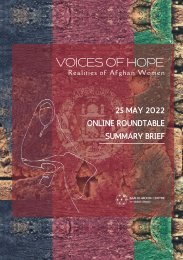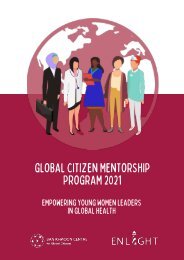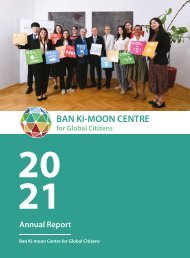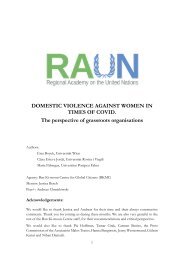Youth Agri Champions Demand Paper 2023
Over the summer of 2023, 17 young farmers, agripreneurs and representatives worked together to create a collaborative demand paper addressing the main 3 challenges they believe farmers face to have sustainable and profitable businesses. This paper details these demands.
Over the summer of 2023, 17 young farmers, agripreneurs and representatives worked together to create a collaborative demand paper addressing the main 3 challenges they believe farmers face to have sustainable and profitable businesses. This paper details these demands.
Create successful ePaper yourself
Turn your PDF publications into a flip-book with our unique Google optimized e-Paper software.
YOUTH AGRI CHAMPIONS<br />
DEMAND PAPER <strong>2023</strong><br />
Smallholder Farmers and Capacity Building for<br />
Climate Change Adaptation<br />
November <strong>2023</strong>
With this goal, at the Ban Ki-moon Centre for Global<br />
Citizens we facilitated the development of a<br />
demand paper by a selected group of <strong>Youth</strong><br />
<strong>Agri</strong><strong>Champions</strong> from Ghana, Kenya, Nigeria,<br />
Rwanda, and Zambia. This group consists of 17<br />
smallholder farmers and farmer representatives as<br />
Foreword<br />
As smallholder farmers are the amongst the most<br />
impacted, it is crucial that capacity building<br />
well as agri-preneurs, all under the age of 35.<br />
occupies a central role in climate adaptation efforts.<br />
I strongly support the <strong>Youth</strong> <strong>Agri</strong><strong>Champions</strong> and<br />
During my tenure as Secretary-General of the<br />
United Nations, I worked tirelessly to bring together<br />
their demands focusing on investment to reach<br />
smallholders on the ground, provide them with<br />
world leaders to address the awaiting impacts and<br />
destructive effects of climate change. This resulted<br />
resources and knowledge as well as to bridge the<br />
in the landmark Paris Climate Agreement signed in<br />
gap between policy, science and farmers.<br />
2015 by 196 countries. However, in discussions<br />
Their invaluable young voices must be brought to<br />
since, the overwhelming focus has been solely on<br />
the decision-making table and their demands must<br />
climate mitigation efforts.<br />
be taken into consideration, most importantly by<br />
world leaders heading the climate negotiations.<br />
Without urgent action now on climate adaptation,<br />
the world will fail to adapt to the impacts of climate<br />
change as needed and further billions of people will<br />
I hope that these explicit demands play a role in<br />
go hungry. Amongst the most impacted are<br />
influencing the global discussion on agricultural<br />
smallholder farmers. They are the least to<br />
adaptation, shaping the agenda on a worldwide<br />
contribute to the causes of climate change and play<br />
scale.<br />
a crucial role in our global food systems. Despite<br />
this they only receive 1.7% of total climate finance.<br />
If smallholder farmers are to continue to feed our<br />
BAN KI-MOON<br />
communities, we have the responsibility to<br />
change by ensuring that they are continuously<br />
8th Secretary-General, United Nations<br />
Co-Chair, Ban Ki-moon Centre for Global Citizens<br />
strengthen their capacity to adapt to climate<br />
trained on climate change adaptation practices.<br />
<strong>Youth</strong> <strong>Agri</strong><strong>Champions</strong> <strong>Demand</strong> <strong>Paper</strong>
Introduction<br />
Why Do Smallholder Farmers<br />
Need More Support?<br />
Smallholder farmers like us produce a third of the<br />
world’s food on their 500 million farms. In some<br />
African countries, we are responsible for over 90%<br />
of food production [1],<br />
and demand for our<br />
products is rising rapidly as populations grow.<br />
However, the impacts of climate change have<br />
become a severe threat to our crops and livestock,<br />
Solutions exist that would allow us to increase our<br />
and are forcing more and more smallholders to<br />
yields despite the changing climate. These include<br />
switching to resilient crop and livestock varieties,<br />
abandon their land, increasing food insecurity in<br />
already vulnerable populations.<br />
using modern technology for purposes such as<br />
better forecasting and efficient irrigation, and<br />
improving practices to prevent soil degradation and<br />
Resilient, productive smallholder farmers are crucial<br />
for the success of the United Nations 2030 Agenda<br />
reduce reliance on pesticides and fertilizers.<br />
<strong>Agri</strong>cultural extension services and capacity<br />
and its Sustainable Development Goals (SDGs), in<br />
building programs disseminate these solutions to<br />
particular SDG 2, Zero Hunger. <strong>2023</strong> marks the<br />
midway point of the implementation of the SDGs,<br />
smallholders. They also serve as a platform to gather<br />
but due to climate change, conflict, and the<br />
further input and feedback from smallholders,<br />
forming an important link between policy, science,<br />
aftermath of the COVID-19 pandemic, rates of food<br />
insecurity and malnutrition are on the rise [2].<br />
and practice. But they are not always effective, and<br />
they do not reach everyone. Below, we have<br />
Support for smallholder farmers is more important<br />
than ever to turn the tide and achieve zero hunger<br />
identified three specific challenges and formulated<br />
sustainably.<br />
three demands to address them.<br />
[1] https://docs.wfp.org/api/documents/WFP-0000133644/download/?_ga=2.98642845.2007065547.1695132276-478443392.1693819407<br />
[2] https://thedocs.worldbank.org/en/doc/40ebbf38f5a6b68bfc11e5273e1405d4-0090012022/related/Food-Security-Update-XC-July-27-<br />
<strong>2023</strong>.pdf<br />
<strong>Youth</strong> <strong>Agri</strong><strong>Champions</strong> <strong>Demand</strong> <strong>Paper</strong> 1
DEMAND 1<br />
STRENGTHENED EXTENSION<br />
SERVICES<br />
<strong>Youth</strong> <strong>Agri</strong><strong>Champions</strong> <strong>Demand</strong> <strong>Paper</strong> 2
The Challenge:<br />
Extension services are not as effective<br />
as they could be<br />
The <strong>Demand</strong>:<br />
Invest in extension services<br />
We ask the international community to support the<br />
Many extension services suffer from inadequate<br />
funding and insufficient staffing, leading to<br />
establishment of farmer field schools to provide<br />
training on practices and the use of technologies<br />
overburdened extension workers who lack the<br />
necessary travel budget to reach all smallholders,<br />
that enhance smallholders’ resilience to climate<br />
change. This requires the training of star farmers<br />
particularly those residing in remote regions. In this<br />
and the establishment of their farms as local centers<br />
case, they are often forced to spend their own<br />
money to prevent the most remote communities<br />
of excellence, where other farmers can receive<br />
training. This methodology has proven highly<br />
from going unserved. Furthermore, farmers are not<br />
always able to make the most of the training<br />
successful because it circumvents language barriers<br />
and allows farmers to see climate-smart practices<br />
opportunities extension services provide.<br />
and technologies in action, and witness their<br />
Not all farmers can afford to leave their fields for a<br />
impacts on yields first-hand. The farmer field<br />
schools should be designed to involve young<br />
day or travel without being compensated. When<br />
they do attend and learn useful new techniques,<br />
farmers, who tend to have the technical knowledge<br />
and forward-looking mindset required to advance<br />
farmers often lack the means to implement them,<br />
due to lack of access to credit or the technologies<br />
climate-smart agriculture.<br />
required. Finally, in many countries, the capacity<br />
building landscape (which includes extension<br />
In addition, we ask governments to develop<br />
consistent national strategies and messaging on<br />
services and trainings organized by other actors) is<br />
fragmented. As a result, farmers receive piecemeal<br />
issues such as monocropping and excessive<br />
training rather than a comprehensive curriculum<br />
and may be overburdened by too many trainings<br />
fertilizer use. Both are inconsistent with climatesmart<br />
agriculture principles but continue to be<br />
promoted by other organizations, undermining the<br />
held as part of different programs.<br />
effectiveness of our capacity building efforts. Based<br />
on the latest evidence, governments should<br />
develop regulations to ensure consistent messaging<br />
across organizations.<br />
BKMC staff meet the <strong>Agri</strong><strong>Champions</strong> from Kenya during a field visit<br />
on one of their farms in September <strong>2023</strong><br />
<strong>Youth</strong> <strong>Agri</strong><strong>Champions</strong> <strong>Demand</strong> <strong>Paper</strong> 3
DEMAND 2<br />
WOMEN AND CAPACITY BUILDING<br />
<strong>Youth</strong> <strong>Agri</strong><strong>Champions</strong> <strong>Demand</strong> <strong>Paper</strong> 4
The Challenge:<br />
Capacity building does not reach<br />
enough women<br />
The <strong>Demand</strong>:<br />
Tailor capacity building to women’s<br />
needs<br />
We ask governments and development partners to<br />
Women make up half the world’s smallholder<br />
farmers, and in Africa they produce 70% of all food<br />
commit to closing gender productivity gaps by<br />
ensuring more women farmers benefit from<br />
[3]. Due to various factors, such as lower access to<br />
agricultural inputs, technologies, and high-quality<br />
capacity building related to climate-resilient<br />
agriculture. To make trainings more accessible to<br />
land, their yields are on average lower than those of<br />
men. Capacity building could help close this gender<br />
women, training providers should use information<br />
productivity gap, but trainings often fail to reach<br />
dissemination channels that reach women; women<br />
are still less likely than men to have access to mobile<br />
women effectively. Women tend to have less<br />
reliable access to information than men and may<br />
phones and the internet [4].<br />
not know that trainings are taking place. If trainings<br />
Times and locations of training sessions should fit<br />
are provided in mixed-gender groups, they may feel<br />
unable to speak up or take initiative.<br />
around women’s schedules, childcare should be<br />
provided, and compensation should be available for<br />
both women and men to make up for lost work<br />
Women are more likely than men to lack the<br />
resources and ability to travel to attend trainings, or<br />
time.<br />
to leave their farms and households for extended<br />
periods of time due to significantly higher<br />
Where possible, women should have the option of<br />
attending women-only trainings, provided by<br />
household and care taking responsibilities.<br />
Trainings are usually scheduled at times that are<br />
female trainers. For occasions when that is not<br />
feasible, extension workers should be trained to<br />
convenient for men, which do not always work for<br />
women. Finally, women often lack decision-making<br />
understand and manage gender dynamics in mixed<br />
groups.<br />
power over how to use the land they farm and are<br />
therefore unable to put their learnings into practice.<br />
Trainings must include information on how gender<br />
equality benefits everyone, and how closing the<br />
gender productivity gap will increase yields overall<br />
[5]. They should also seek to increase support for<br />
women as decision makers within communities.<br />
[3] https://www.weforum.org/agenda/2018/03/women-farmers-food-production-land-rights/<br />
[4]https://www.itu.int/en/mediacentre/backgrounders/Pages/bridging-the-gender-divide.aspx<br />
[5]https://africa.unwomen.org/sites/default/files/Field%20Office%20Africa/Attachments/Publications/2016/03/tech%20for%20rural%20<br />
women%20policy%20brief-web.pdf<br />
<strong>Youth</strong> <strong>Agri</strong><strong>Champions</strong> <strong>Demand</strong> <strong>Paper</strong> 5
DEMAND 3<br />
CONNECTING POLICY, SCIENCE AND<br />
PRACTICE<br />
<strong>Youth</strong> <strong>Agri</strong><strong>Champions</strong> <strong>Demand</strong> <strong>Paper</strong> 6
policies are designed to decarbonize economies<br />
As<br />
improve the resilience of agrifood systems,<br />
and<br />
farmers too often do not get a seat at<br />
smallholder<br />
decision-making table. This is a missed<br />
the<br />
as smallholders and policymakers have<br />
opportunity,<br />
to learn from each other. Greater<br />
much<br />
of smallholder farmer groups in policy<br />
participation<br />
and the design of implementation<br />
formulation<br />
could help ensure that policies adopted<br />
frameworks<br />
evidence-informed, needs-oriented, and<br />
are<br />
No decisions should be made<br />
implementable.<br />
smallholders without their involvement.<br />
about<br />
the challenges smallholder farmers face are<br />
Though<br />
at the same time, rapid scientific progress<br />
growing,<br />
technological innovation are unlocking new<br />
and<br />
for smallholders everywhere, not just to<br />
possibilities<br />
to climate change, but to increase their<br />
adapt<br />
food security and quality of life.<br />
production,<br />
it often takes a long time for new<br />
However,<br />
and innovations to reach smallholder<br />
knowledge<br />
the same time, smallholder farmers hold<br />
At<br />
traditional knowledge on crops and<br />
invaluable<br />
methods, and from their position on the<br />
farming<br />
of climate change, they are better able<br />
frontline<br />
most to keep track of its impacts. This<br />
than<br />
is not yet widely used in academia.<br />
knowledge<br />
engagement between scientists, innovators<br />
More<br />
smallholders could further accelerate the pace<br />
and<br />
agricultural innovation, ensure that new tools<br />
of<br />
approaches are fit for purpose, allow for shorter<br />
and<br />
loops, and support more rapid<br />
feedback<br />
dissemination.<br />
capacity building on climate resilient<br />
Effective<br />
must create stronger links between<br />
agriculture<br />
farmers and agricultural policy, science,<br />
smallholder<br />
technological innovation. We ask governments<br />
and<br />
development partners to actively pursue and<br />
and<br />
in strengthening these links. Trainers and<br />
invest<br />
farmer groups must be empowered to<br />
smallholder<br />
as conduits between policy/academia and<br />
serve<br />
farmers, to disseminate new policies,<br />
smallholder<br />
and technologies; and to convey<br />
practices,<br />
observations, and genderdisaggregated<br />
knowledge,<br />
data from the field back to<br />
and academia, to facilitate evidencebased<br />
policymakers<br />
decision making and practice-oriented<br />
The Challenge:<br />
Policy, science, and practice remain<br />
disconnected<br />
The <strong>Demand</strong>:<br />
Strengthen links between policy,<br />
science, and practice<br />
farmers.<br />
research.<br />
<strong>Youth</strong> <strong>Agri</strong><strong>Champions</strong> <strong>Demand</strong> <strong>Paper</strong> 7
achieve this, governments should consider<br />
To<br />
platforms for regular exchange and<br />
establishing<br />
between smallholder farmer groups,<br />
collaboration<br />
policymakers across different relevant<br />
trainers,<br />
academia, and other stakeholders. For<br />
departments,<br />
policy issues, such as water management or<br />
specific<br />
promotion of off-grid energy solutions in<br />
the<br />
agriculture, task forces should be<br />
smallholder<br />
including farmers, trainers, academics, and<br />
created,<br />
associations, to support the development<br />
industry<br />
institutions should commit to<br />
Academic<br />
their links with smallholder farming<br />
strengthening<br />
facilitating engagement between smallholder<br />
by<br />
and students and faculty in relevant<br />
farmers<br />
such as agricultural sciences, land and<br />
disciplines<br />
management, environmental policy,<br />
water<br />
should initiate further joint research projects<br />
They<br />
farming communities and encourage students<br />
with<br />
spend time with smallholder farmers and delve<br />
to<br />
agricultural innovation. This would ensure that<br />
into<br />
policymakers, project managers, and<br />
tomorrow’s<br />
have a deeper understanding of the<br />
academics<br />
of smallholder farming, and of the practical<br />
realities<br />
of their policies and projects.<br />
implications<br />
should put their innovation<br />
Governments<br />
to work for smallholder farmers,<br />
ecosystems<br />
start-ups that provide new technological<br />
supporting<br />
facilitating affordable loans, tax incentives<br />
solutions,<br />
pay-as-you-go business models to make those<br />
and<br />
more accessible to smallholder farmers,<br />
solutions<br />
launching initiatives such as hackathons and<br />
and<br />
challenges to overcome common<br />
innovation<br />
UN Secretary-General Ban Ki-moon and BKMC staff meet the <strong>Agri</strong><strong>Champions</strong> from Kenya<br />
8th<br />
the Africa Climate Summit in Nairobi, Kenya - September <strong>2023</strong><br />
during<br />
of effective policies.<br />
problems.<br />
environmental and biosystems engineering.<br />
<strong>Youth</strong> <strong>Agri</strong><strong>Champions</strong> <strong>Demand</strong> <strong>Paper</strong> 8
services are not<br />
Extension<br />
effective as they could be<br />
as<br />
building does<br />
Capacity<br />
reach enough women<br />
not<br />
capacity building to<br />
Tailor<br />
needs<br />
women’s<br />
science, and practice<br />
Policy,<br />
disconnected<br />
remain<br />
links between<br />
Strengthen<br />
science, and practice<br />
policy,<br />
the demands in this paper are based on our<br />
While<br />
and experiences, we believe that the<br />
knowledge<br />
and initiatives outlined would<br />
interventions<br />
enhance the resilience of smallholder<br />
strongly<br />
beyond our countries. Our demands are<br />
farmers<br />
interconnected and will have the greatest<br />
closely<br />
if they are implemented as a comprehensive<br />
impact<br />
package.<br />
the demands include many entry points<br />
Moreover,<br />
allow practitioners to start small if budgets are<br />
that<br />
Simply adjusting the timing of trainings to<br />
limited.<br />
around women’s schedules, for instance, will<br />
fit<br />
greater participation by women<br />
facilitate<br />
farmers and contribute to closing<br />
smallholder<br />
are convinced that our demands will guide<br />
We<br />
in securing better opportunities for<br />
action<br />
farmers to adapt to a changing climate<br />
smallholder<br />
that is why we forcefully demand that<br />
and<br />
international organizations, NGOs<br />
governments,<br />
the private sector uphold initiatives that<br />
and<br />
investment in extension services, tailor<br />
increase<br />
building to women´s needs, and forge<br />
capacity<br />
links between policymakers, scientists,<br />
stronger<br />
and smallholder farmers.<br />
innovators<br />
Summary<br />
Strengthened Extension Services<br />
Conclusion<br />
Challenge:<br />
<strong>Demand</strong>:<br />
Invest in extension services<br />
Women and Capacity Building<br />
gender gaps.<br />
Challenge:<br />
<strong>Demand</strong>:<br />
Undersigned,<br />
Connecting Policy, Science and<br />
Practice<br />
Challenge:<br />
The <strong>Youth</strong> <strong>Agri</strong><strong>Champions</strong><br />
Aaron, Annat, Esther, Everlyne, Felix A.,<br />
Felix T., Halima, Helene, Irene, Lubona,<br />
<strong>Demand</strong>:<br />
Hafiz, Mubanga, Opeyemi, Quinter, Segun,<br />
Suleiman, Venacious<br />
<strong>Youth</strong> <strong>Agri</strong><strong>Champions</strong> <strong>Demand</strong> <strong>Paper</strong> 9
<strong>Youth</strong> <strong>Agri</strong><strong>Champions</strong> <strong>2023</strong> are a group of<br />
The<br />
smallholder farmers, agripreneurs, and<br />
young<br />
representatives from Ghana, Kenya, Nigeria,<br />
farmer<br />
and Zambia, convening under the<br />
Rwanda,<br />
of the Ban Ki-moon Centre for Global<br />
auspices<br />
(BKMC) as part of its Elevating <strong>Agri</strong>cultural<br />
Citizens<br />
program. The group came together for<br />
Adaptation<br />
series of workshops during the summer of <strong>2023</strong> to<br />
a<br />
challenges smallholder farmers face,<br />
discuss<br />
in relation to capacity building. Based<br />
particularly<br />
their knowledge and experiences, the <strong>Youth</strong><br />
on<br />
developed a set of demands<br />
<strong>Agri</strong><strong>Champions</strong><br />
towards the international community to<br />
directed<br />
capacity building for smallholder farmers<br />
improve<br />
provide them with the tools and means to<br />
and<br />
to current and future climate change impacts.<br />
adapt<br />
Ban Ki-moon Centre for Global Citizens’ mission<br />
The<br />
to foster leadership for the implementation of the<br />
is<br />
Development Goals and the Paris<br />
Sustainable<br />
Agreement by inspiring current leaders -<br />
Climate<br />
makers and empowering the next<br />
decision<br />
of leaders – change makers.<br />
generation<br />
with governments, civil society, academia,<br />
Working<br />
international organizations, the BKMC has<br />
and<br />
more than 770,000 people around the<br />
reached<br />
to date. Located in Vienna, Austria, the BKMC<br />
world<br />
co-chaired by the 8th Secretary-General of the<br />
is<br />
Ban Ki-moon, and the 11th President of the<br />
UN,<br />
Reithuber, Program Manager<br />
Angela<br />
Rocca, Administrative & Program Associate<br />
Beatrice<br />
ABOUT THE WORKSHOP SERIES<br />
THE YOUTH AGRI CHAMPIONS<br />
Aaron Nanok, 32, Kenya<br />
Annat Shittu, 23, Nigeria<br />
Esther Kamasa, Kenya<br />
Everlyne Ngugi, 27, Kenya<br />
Felix Atamba, 21, Kenya<br />
Felix Tetteh, 26, Ghana<br />
Halima Sadiya Ahmad, 23, Nigeria<br />
Helene Uzayisenga, 35, Rwanda<br />
Irene Kagera, 34, Kenya<br />
Lubona Annie Mwale Chifita, 30, Zambia<br />
Mohammed Hafiz Musah, 26, Ghana<br />
Mubanga Sampa, 34, Zambia<br />
Opeyemi Elujulo, 32, Nigeria<br />
Quinter Chemutai, 25, Kenya<br />
ABOUT THE BKMC<br />
Segun Adegoke, 29, Nigeria<br />
Suleiman Dawud, 26, Nigeria<br />
BKMC FACILITATORS<br />
Venacious Tembo, 26, Zambia<br />
LAYOUT DESIGNER<br />
ILLUSTRATIONS<br />
Katre Olmez, BKMC Chief Communications Officer<br />
Gabriela Rueda<br />
BKMC CONSULTANT<br />
Republic of Austria, Heinz Fischer.<br />
Maria van Veldhuizen<br />
<strong>Youth</strong> <strong>Agri</strong><strong>Champions</strong> <strong>Demand</strong> <strong>Paper</strong>
P.O.B. 0018 1037 Vienna, Austria<br />
office@bankimooncentre.org<br />
www.bankimooncentre.org<br />
@bankimooncentre<br />
https://bankimooncentre.org/youth-agri-champions/


